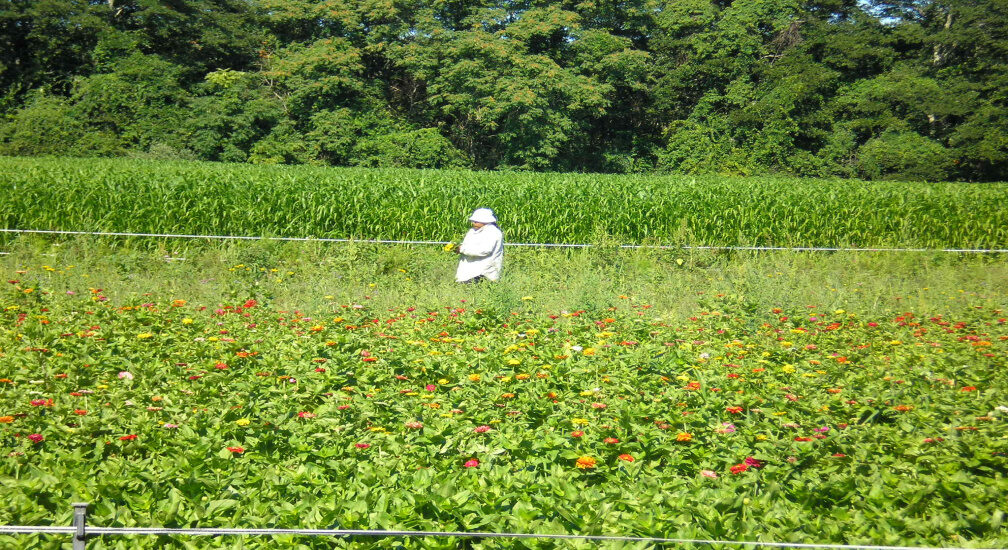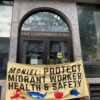
To Premier Stephen McNeil, Honourable Labi Kousoulis (Minister of Labour and Advanced Education), Honourable Keith Colwell (Minister of Agriculture and Minister of Fisheries and Aquaculture), Honourable Randy Delorey (Minister of Health and Wellness), Honorable Chuck Porter (Minister of Municipal Affairs and Housing), Honorable Lena Diab (Minister of Immigration) and Honorable Mark Furey (Minister of Justice):
Throughout Canada, we are seeing migrant workers being impacted by COVID-19 at an alarming rate. On July 2nd, we learned that a migrant worker had tested positive for COVID-19 in Nova Scotia. We are urging your government to take immediate action to ensure the health and safety of all migrant workers in this province.
Every year, approximately 2,000 migrant workers contribute to the planting, harvesting, and processing of agricultural crops and seafood products through Temporary Foreign Worker Programs (TFWPs) such as the Seasonal Agricultural Worker Program (SAWP). Migrant workers are essential members of our communities and essential workers, and we are deeply concerned for their safety and well-being.
Since 2009, at least 89 complaints have been made by Mexican migrant workers on Nova Scotia farms, including for wage theft, as well as inadequate and cramped housing conditions. The recently released report Unheeded Warnings: COVID-19 and Migrant Workers in Canada written by the Migrant Workers Alliance for Change (MWAC) includes accounts from migrant workers in Nova Scotia of being coerced into speaking positively of their employers during a government inspection under threat of deportation. Other workers report having racist slurs used against them when they spoke out about poor conditions. We’ve also received numerous reports of migrant workers being unlawfully prevented from leaving Nova Scotia farms. These complaints are likely only the tip of the iceberg.
Migrant workers risk their lives to come to Canada. Unsafe working and housing conditions also place migrant workers in life-threatening situations. Already, three migrant workers have died from COVID-19 in Ontario, while over 1300 have tested positive in that province alone. Migrant workers have also been impacted by outbreaks of COVID-19 in Alberta, Quebec and Manitoba, and cases have also been reported in New Brunswick. While the federal government has a role to play, provincial governments also need to act immediately to ensure that there are no more migrant worker deaths.
It’s clear that systemic issues are leading migrant workers to be disproportionately impacted by COVID-19. “Temporary” migration status means that they’re placed in a vulnerable situation and are less able to exercise rights than other workers. For this reason, we are calling on the federal government for immediate permanent residence status for all migrants, including migrant workers.
Action can and must be taken at the provincial level as well. We urge the McNeil government to use its provincial powers to enact recommendations from the MWAC report Unheeded Warnings. The report is based on accounts from over 1000 migrant workers, including 80 from Nova Scotia. Moreover, we continue to call for public healthcare to be made accessible to everyone, regardless of their immigration status .
Our calls to action to the Nova Scotia government are the following:
Protect migrant worker health and safety
1) Ensure that all migrants in the province, including migrant workers, have access to Nova Scotia’s public healthcare system.
2) a) Provide hospitals with appropriate resources and funding to ensure information and care is provided in migrant workers’ languages during visits and hospitalizations. b) Provide workers with public health information, in appropriate languages, on handwashing and physical distancing during the COVID-19 pandemic.
3) End the practice of medical repatriation, and remove medical inadmissibility rules. While medical inadmissibility rules are federal, the province has power and a role to play to stop employers from attempting to end their employment of and responsibility for injured or sick migrant workers when those conditions arise from work, including transportation to work.
4) End the food sector’s exemption from the Nova Scotia Department of Health’s social distancing requirements, as this exposes migrant workers and other workers to unsafe working conditions and serves as a barrier for them to access the right to refuse unsafe work. All workers must be able to refuse unsafe work.
5) During the pandemic, including the quarantine period, migrant workers must be able to practise social distancing and must be provided with Personal Protective Equipment, both in housing and at work.
6) Proactively conduct random, unannounced, on-site inspections of workplaces, including housing, in collaboration with migrant worker support organizations and advocates.
Suspend work at COVID-19 worksites
7) In the event that working and living conditions on worksites (ie. farms) where there is COVID-19 cannot be immediately adapted to protect the safety of workers, all work must be stopped. Facilities must be fully disinfected and only reopen when worker safety can be guaranteed. Names of farms where there have been COVID-19 outbreaks must be released.
8) Provide immediate income support to all workers at workplaces impacted by COVID-19 outbreaks.
Make quarantine work for migrant workers
9) Consult with migrant worker support organizations to create a proactive and responsive monitoring and enforcement system to respond to workers’ complaints. In coordination with local public health officials, the system must include swift, unannounced, and in- person inspections on employers where complaints have been made. Employers found not to be in compliance should be shut down by order of the province’s Chief Medical Officer and all employees should be provided with open work permits.
10) COVID-19 quarantine requirements for employers must be made available directly to workers, with information on how workers can assert their rights and make anonymous complaints.
11) Establish an accessible interface for workers and their support organizations to make complaints (and/or give anonymous tips) to trigger inspections. The results must be posted in workers’ languages at the worksite in plain view and be accessible to support organizations.
12) Workers must be appropriately compensated where employers put workers’ lives at risk through noncompliance with guidelines. Workers who refuse to perform unsafe work due to employer non-compliance with guidelines must be able to exercise their right to refuse unsafe work and be compensated for hours lost while refusing unsafe work.
Create dignified living conditions
13) Employers must not prevent or limit migrant workers from leaving farms for sending remittances, buying groceries, receiving social support or accessing healthcare, Wi-Fi and phones. Neither employers nor the province have legal authority to allow workers to be contained beyond quarantine requirements. To do so is illegal conduct by employers and a violation of human rights of migrant workers because other workers are not subjected to this unlawful restriction of liberty. If an employer is found to have prevented or restricted migrant workers from leaving farms, the employer must immediately be ordered to cease their restrictions, and if they refuse, their operations should be suspended. Any loss of income by migrant workers in these circumstances should be fully compensated and the workers should be covered until operations resume or new work is found.
14) Frequent and random in-person housing inspections should be mandated throughout the season, particularly during COVID-19. Employer-provided housing must meet all minimum provincial and municipal housing standards. In cases where they do not, the employer must be required to immediately provide alternative housing that does meet the standards, at no cost to workers.
Ensure decent work
15) Increase wages for migrant workers permanently and ensure that migrant workers are being paid for their overtime work.
16) Provide migrant workers access to all labour rights, including worker compensation, without exemptions and exclusions.
Ensure confidentiality of complaints
17) Under the provincial Labour Standards Code and any other provincial Act, migrant workers who make complaints must be protected against retaliation. The worker’s identity must be kept confidential and not be accessible to consulates, private security. police, employers or compliance investigators to prevent repatriation and being barred from the Program. Government must develop specific anti-racism measures in conjunction with migrant workers and support organizations.
SIGNED BY
- African United Baptist Association of Nova Scotia;
- Alternatives to Violence – Atlantic;
- Antigonish Women’s Resource Centre;
- Atlantic Regional Solidarity Network;
- Canadian Federation of Students – Nova Scotia;
- Colleen Coffey, Regional Executive Vice-President – PSAC;
- Atlantic Council of Canadians Atlantic Office;
- CUPE Nova Scotia;
- Dalhousie Legal Aid Services;
- Dalhousie University, Department of International Development Studies;
- Dalhousie University, Department of Sociology and Social Anthropology;
- Educators for Social Justice – Nova Scotia;
- ElevateHER Mental Health Support Services Canada;
- Environmental Noxiousness, Racial Inequities & Community Health Project (ENRICH);
- Fight for $15 and Fairness – Halifax;
- Global Afrikan Congress – Nova Scotia Chapter;
- Halifax-Dartmouth & District Labour Council;
- Halifax Religious Society of Friends (Quakers);
- Halifax Workers Action Centre;
- Halifax Refugee Clinic;
- Immigrant Migrant Women’s Association of Halifax (IMWAH);
- KAIROS Halifax;
- Maritimes-Guatemala Breaking the Silence Network;
- No One is Illegal – Halifax/K’jipuktuk;
- Nova Scotia College of Social Workers;
- Nova Scotia Federation of Labour;
- Nova Scotia Public Interest Research Group;
- Nova Scotia Voice of Women for Peace;
- Saint Mary’s University, Department of Social Justice & Community Studies;
- Solidarity Halifax;
- Tatamagouche Centre;
- YWCA Halifax
With a special thanks to our generous donors who make publication of the Nova Scotia Advocate possible.
Subscribe to the Nova Scotia Advocate weekly digest and never miss an article again. It’s free!



